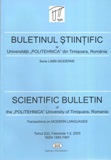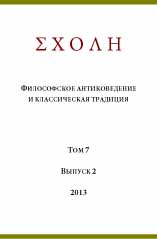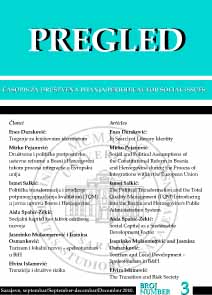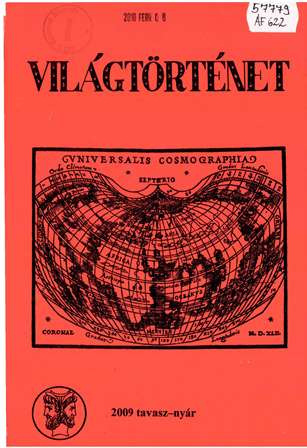Keywords: caregivers; family; vulnerable children; children's homes; roles/ responsibilities
The study investigated the perceptions that caregivers working at children’s homes have regarding their roles/responsibilities. The aim was to obtain insight into their subjective experiences and realities. This qualitative study was guided by the interpretive paradigm and included eleven caregivers. Focus group discussions, group collage and semi-structured interviews served as data collection methods. The caregivers perceived their roles/responsibilities as including the provision of food, shelter and protective environment; also catering to the children’s emotional and health requirements. Caregivers viewed their work environment as child-focused and expressed the need to be acknowledged as professionals and to be empowered with more training.
More...Keywords: Roma population; health mediators; physician-patient communication
Overall, the access of ethnic minority populations to the health care system is modest due to several factors: patient-physician communication barriers, strikingly different interpretation of diseases, different conceptions of illness and health care, etc. The Roma minority in Romania is a vulnerable, discriminated population, which, when faced with disease, behaves according to traditional values and principles regarding the meaning of the disease and treatment that often differ from the views of the general population. The profession of health mediator was introduced so as to facilitate the access of the Roma population to the health care system, to facilitate the communication between health professionals and Roma groups and not in the least to facilitate the implementation of public health programs in Roma communities. As part of a European project we conducted an extensive qualitative study centered on perceptions and attitudes about death, chronic diseases, terminal stages and dignity preservation among the Roma population, in the context of health services. This paper aims to present ethical medical issues raised by Roma health mediators during their daily activities. The method for data collection was the focus group. We conducted group interviews with 30 of the Roma health mediators working in communities from Iasi and Cluj. The main issues discussed which interfered with medical ethics were: stigma and discrimination in the provision of health services, barriers in doctor-patient communication, failure by doctors to patients' wishes regarding compliance to ethnic habits, maintaining the confidentiality of diagnosis compared to other Roma community, communicating a fatal diagnosis, the process of making medical decisions. These results pave the way towards achieving informative materials or organizing workshops in order to culturally adapt the medical approach of Roma patients.
More...Keywords: aging societies; gerontology; homogeneity-heterogeneity; ethical-moral; interdisciplinarity
We are facing a truly irreversible: the population aged over 65 tend to represent the mid-21st century, a quarter of its population. Awareness of this reality, invite reflection and knowledge, on the one hand, and change, on the other side. So knowing how much change is desirable and would come from several perspectives: economic, political, legislative, administrative, structural, societal, cultural, and last but not least, moral and ethics. Analyses of demographic, political and legislative signals global aging societies, and the fact that they are unprepared to cope with the complexity of the phenomenon. Conceptual analysis, through the concepts of homogeneity-heterogeneity, and in terms of ethical and moral concepts, highlights the urgent stretching for gerontological knowledge, multidisciplinary and interdisciplinary perspectives. Realized that the elderly population is a heterogeneous category, even if demographic aging is a global phenomenon has consequences in the action plan and social attitudes: ethics society is one that is oriented towards raising awareness and changing the discourse, in relation to the increasing number of generations elderly. Leave more space for personal ethical attitude historicity, context and becoming individual existence, diversity.
More...Keywords: ethics; social research; public opinion; public policy
Social research sets the baselines in many of the stages of the public policy cycle. It is important for people to trust these survey results in order to keep a certain social order. This paper discusses whether there is any social research ethics behavior to be considered, at all. The survey results help the authorities to legitimize the important financial resources they spend for implementing the public policy which people believe that solves their major problems. But those problems could not be really theirs; they could be just part of the elite’s hidden agenda that is brought into the public’s attention by the surveys. This article reveals some ways of tricking the public eye without any obvious violation of any social research ethic code. The standards in the social research field mainly refer to methodological aspects and not to the conceptualization of the themes and the contextualization of the analyses. They may say what a random sample is, but they don’t set the limits of analyzing the answers of a small group from the random sample as being significant when compared to the whole. The public opinion that seems to be questioned by the elites doesn’t exist before, it is manufactured while the surveys are carried on and it is stabilized once the results are spread by the media. Legitimizing the elite’s public policy actions through public opinion polls is not the side-effect; it is the main purpose of using public surveys in such cases. The discussion on the social research ethics is replaced by the discussion on the researchers’ moral behavior.
More...Keywords: ethical dilemma; abuse; recurrence; risk assessment
Ethical dilemmas are inherent in the practice of child protective services. To decide what is best for a child’s life usually implies uncomfortable and uncertain factors, which may cause inner conflicts in all the people who are involved in the case. The recurrence of child abuse and/or neglect is a phenomenon which is quite common in the practice of social care services. This article aims to discuss some aspects that account for the ways and methods to assess and to make a pertinent ethical decision, which would be able to avoid repeated incidents of child abuse and/or neglect.
More...Keywords: return migration; governmental initiatives; emigration; reintegration
This paper summarizes the most important governmental initiatives aimed at return migrants or Romanian citizens settled temporarily abroad. Romania’s membership in the European Union has transformed the notion of migration into mobility, enabling Romanians to become mobile E.U. citizens with a regulated legal status. The status of Romania as one of the top countries of emigration in the last years, with over two million citizens living in other E.U. member states, lead to a high economic, demographic and social impact. Most Romanian emigrants have economic reasons and are part of the active population - thus creating shortages in some economic sectors in their country of origin. The immigration process as a possibility to compensate the mass emigration is far from being a valid alternative, with the number of immigrants in Romania representing less than 1% of the total population. Therefore the interest of Romanian authorities to convince its citizens to return should be more consistent, taking into accounts the induced positive consequences (e.g. social and economic remittances that migrants are bringing back with them). The paper is based on data provided by authorities responsible for relevant information about Romanian emigrants or the integration of those who already returned (e.g. Ministry of Labour; National Agency for Employment). Our analysis shows that although the emigration of Romanians became an important fact during the last years, the initiatives aimed to sustain their return or reintegration are still rather limited in scope and effects, and that they should be expanded to address a larger variety of needs.
More...Keywords: ethics; social work; confidentiality; stigma; HIV
In late 2014 Romanian newspapers present a case from the city of Segarcea where an HIV positive youth, recently deceased, engaged in sexual intercourse with several young females and presumably infected them with HIV. The aim of the article is to discuss this case from legal and ethical perspectives, in the context of stigma, confidentiality and its limits. Recent evidences in the field of HIV are presented to better understand the implications of risk behaviours. Following the provisions of the Deontological Code and research findings in biomedical domain implications for practice are discussed and some possible ways forward for the practice of social workers when facing similar ethical dilemmas.
More...Keywords: public management; the theory of Public Value; responsibility; ethics and responsibility
The public values are currently a mark in the decision-making process in the public management sector. The theory of Public Value (or the New Public Service) confers an important role to managers that are seeking "to maintain the organization's legitimacy in the eyes of the public". Its essence consists to assume full responsibility by the managers and the organization that they lead, both for the citizens and for the politicians who formulate the public policies. This paper brings into focus the importance of the concept of responsibility in the public management and its relationship with ethics.
More...Keywords: globalization; personality types; glocalization
Are we just a consciousness of the mind that is in a body and which has the ability to feel emotions and decide on the most rational way to pursue ones goals or is there something more to being human which science looks at with suspicion? We sense we have a soul and that somehow it is connected with the destiny of the entire humanity but science has not been able to measure it or account for it so for all we know, it may just be pure speculation. This article tries to propose a 4D paradigm of Body, Emotions, Mind and Spirit instead of the current 3D paradigm of just Body, Emotions and Mind and proposes the fact that the physical manifestation of Spirit, that integrates both the body, the mind and the emotions is the individual personality type. This article is a journey inside the current of globalization and seeing how its integrative nature follows the same pattern that our individual personalities follow in our own life: an inward journey, a journey of re-integration and re-discovery of ones self, just as the world rediscovers itself through the globalization – glocalization dynamic.
More...Keywords: psychosocial-oncology; ethical issues; professionals; cancer patients; Romania
In this study we aimed to investigate experiences and challenges faced by Romanian professionals working in psychosocial oncology carein order to identify the stage of development of this area seven years after Romania joined the European Union.To meet this goal, we have structured our study into seven sections. Thus, in the second section, which follows the introductory part, we define the field of psychosocial care in oncology and briefly describe the evolution of this field both on international and national level. The third section briefly overviews standards of practice and ethical principles in psychosocial oncology care, as they were adapted from the American Association of Oncology Social Workers (AOSW). Next, we present the first empirical study we conducted among Romanian professionals in psychosocial oncology care. Section four, which presents the methodology used in the research, is followed by detailed description of preliminary results of the study. In this regard, the fifth section presents results structured by main dimensions, variablesincluded in the research:socio-demographic and professional characteristics;aspects of job satisfaction; opinions and attitudes about work and cancer patients’ distress; awareness of the state of psychosocial oncology development in Romania; and currentprofessional needs.Section six reflects relevant implications for professional ethics in psychosocial oncology care, which leads to directions for future action to improve services in psychosocial cancer care in Romania, in the seventh, last section.Translation from power to empowerment is an unsolved professional need in cancer care in Romania, as patients are still approached by professionals with over-protective and avoidant attitudes, which make them vulnarable to victimhood. Cancer patients in Romania are not yet considered active partners in helping, supportive relationships.
More...Keywords: social work; art therapy; creativity; ethical principles; empowerment
Art is „the meeting ground of the world inside and the world outside” (Ulman, 1996), this is an expressive metaphor to identify the arguments of the liaison between the social work and art therapy. Both of them are spaces of confluences and interactions; through specific modalities, they fulfill the same basic functions: recovery, facilitating access to development resources, education, strengthening the protective factors and improvement of the social functioning of the individuals, families, groups and communities. Finally, each of the two types of activities are governed by values and ethical principles, the most common, whose operationalization is a condition for accomplishing their own missions, both for social work and the art therapy. The respect for the dignity and uniqueness of the individual, the pragmatism and confidentiality, self-determination, form the common axiological foundation for the social work and art therapy. Of the values and ethical principles characteristic for the art therapy, we will analyze the creativity, because in the common ground, both social work and art therapy draw upon the creativity mediation potential. We will try to illustrate the versatility of the creativity that makes of itself a resource and a tool for the artistic expression, and on another hand, allows it to act as a facilitator, as discreet as it is productive for the operationalization of other ethical values, such as dignity and autonomy.
More...Keywords: suicide; prevention; lifeline; children; teenagers
Suicide is one of the leading causes of teenagers’s deaths. Even whether it is preventable, most of the time, there are still very few projects or actions of the local authorities and/ or organisations in Romania, due to the lack of information and resources. The suicide prevention line for children and teenagers in Bucharest is presented and evaluated after five years of activity. It may be considered one example of good practises, since it managed to put together local knowledge, human resources and social actors. The suicide prevention line for children and teenagers in Bucharest has been established in 2009 by The General Directorate of Social Wellfare of Bucharest Municipality, in partnership with The Psychiatric Hospital Prof. dr. Alexandru Obregia. The finances are provided by the Wellfare Department, the location belongs to the Psychiatric Hospital and the mental health services are coordinated by a MD, specialized in Psychiatry. There are about 30 volunteers taking the phone calls 24/7. Since 2011, they established the Association of Suicidology.
More...




